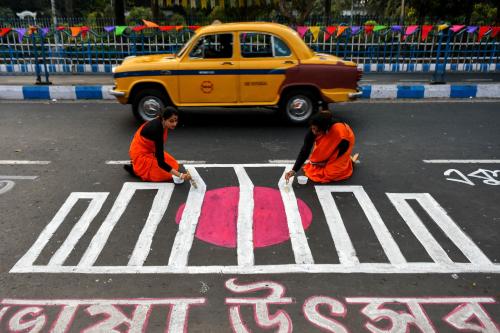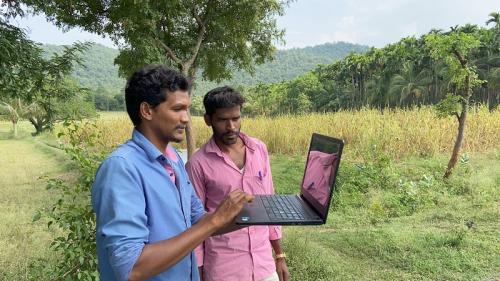The advent of the Fourth Industrial Revolution and its accompanying technological advancements has commanded the attention of countries worldwide, leading to an unprecedented adoption and interest in leveraging artificial intelligence (AI). As AI increases in ubiquity, countries in the Global South, including Africa, Southeast Asia, Latin America, and the Caribbean, have begun to capitalize on the opportunities presented by these technologies despite early development being primarily concentrated in the West. Given the historical development challenges that countries in the Global South have faced, AI stands to help advance progress in critical domains such as agriculture, healthcare, and education. However, rising concerns about the ethical implications of using AI also present new challenges for countries in this region to address, along with handling existing development priorities.
As the development of AI advances rapidly and demonstrates the potential to bolster economic growth, governments in the Global South must understand how to make progress toward enacting robust AI regulation and building thriving AI ecosystems that sustainably support startup growth and the development of research and engineering talent. A part of this progress will involve the equitable inclusion of countries from the Global South in roundtable convenings, working groups on AI, and high-level advisory bodies such as those initiated by the U.K. government, OECD, and the United Nations. However, the inclusion of the Global South in these initiatives should also be a goal of countries that have dominated the current AI discourse. The White House’s plans to lead critical global conversations and collaborations on AI, as outlined in the recently issued Executive Order on the Safe, Secure, and Trustworthy Development and Use of Artificial Intelligence, should deliberately seek participation from stakeholders and governments in the Global South to inclusively work towards an equitable era of AI.
Over the past decade, the Global South has adopted AI tools to address traditional development challenges, and there exists a diverse array of use cases for AI among member countries in the Global South, particularly in agriculture, healthcare, and education. Within agriculture, projects have focused on identifying banana diseases to support farmers in developing countries, building a deep learning object detection model to aid in-field diagnosis of cassava disease in East Africa, and developing imagery observing systems to support precision agriculture and forest monitoring in Brazil. In healthcare, projects have focused on building predictive models to keep expecting mothers in rural India engaged in telehealth outreach programs, developing clinical decision support tools to combat antimicrobial resistance in Ghana, and using AI models to interpret fetal ultrasounds in Zambia. In education, projects have focused on identifying at-risk students in Colombia, enhancing English learning for Thai students, and developing teaching assistants to aid science education in West Africa. There is much anticipation for an increase in AI innovation over the next decade as companies, governments, and various organizations actively work to expand their development.
The emergence of AI within the Global South has also provided opportunities to democratize current AI practices, lead towards the development of more inclusive AI systems, and increase participation from communities underrepresented in AI development. Grassroots organizations, such as Masakhane and Ghana NLP, have emerged to focus on developing datasets and machine translation tools to help expand access to low-resource African languages. Efforts such as Deep Learning Indaba, Khipu, AI Saturdays Lagos, and Data Science Africa, amongst many others, have been instrumental in growing communities of AI researchers and developers within Africa and Latin America by hosting conferences and workshops and helping build local expertise in emerging technology. Many of these issues were recently raised in a Brookings webinar that included leaders from civil society organizations in the Global South, who helped to frame productive dialogues around these and other issues. As calls for localized development of AI systems increase, these organizations will become even more critical in ensuring that AI development meets the needs and interests of local communities.
Large tech companies have continued to expand their footprint in the Global South by establishing research labs, development centers, and engineering offices. IBM was one of the first big tech companies to establish an industry research lab in the Global South, building IBM Research India in 1998. Since then, IBM has launched research labs in São Paulo and Rio de Janeiro (2010), Nairobi (2013), and Johannesburg (2016). India has continued to be a market entry point for big tech research labs in the Global South, with Microsoft opening Microsoft Research India in Bangalore in 2005. Microsoft has continued to expand its reach, opening its Africa Development Center with two locations in Nairobi and Lagos in 2019 and launching the Microsoft Africa Research Institute, also in Nairobi in 2020. Google has also built up its research presence in the Global South, launching an AI research lab in Accra in 2018 and Bangalore in 2019. While developing research labs in the Global South is one step in advancing progress within AI, it is also important to understand that there is significant infrastructure and human capital necessary to maintain these labs and develop broader AI ecosystems.
Despite the opportunities presented by AI, several challenges remain. Infrastructure challenges plaguing countries in the Global South could potentially hinder the development of AI in these regions with the large amounts of data needed to train AI systems and the high number of computing resources consumed in this process. Africa particularly struggles with internet access. In the last decade, internet penetration in Africa rose significantly, increasing from eight percent in 2011 to 36% in 2021. Limited internet penetration within Africa can largely be attributed to inadequate access to electricity and insufficient investments in crucial internet infrastructure components such as fiber optic cables, cellular towers, and base stations. According to data from the World Bank, 80.7% of the urban population in Sub-Saharan Africa is connected to electricity. Comparatively, South Asia has an urban electricity connectivity rate of 99.9, and Latin America and the Caribbean have a rate of 99.5%. This figure drops to 30.4% in rural Sub-Saharan Africa, compared to 98.3% in rural South Asia and 96.5% in rural Latin America and the Caribbean.
Concerns regarding the negative impacts of AI have led to a wide array of conversations regarding its use in domains such as healthcare, employment, and policing. However, many of these concerns have primarily been concentrated on the West, excluding perspectives on how AI may affect countries in the Global South. The Global South has also routinely become a destination for outsourced data labeling labor, with companies, such as Sama and Scale AI, relying on workers from this region. Recent coverage has highlighted the harms data workers and content moderators in East Africa and South Asia have faced when exposed to graphic content. And there are concerns that this exploitation could continue or even worsen. The lack of robust data protection and AI policies in the Global South could potentially lead to greater levels of misuse as AI grows in reach. Given that AI legislation is still in early development globally, there is an opportunity for countries in the Global South to circumvent the potential negative impacts of AI. To counter these harms, governments representing these countries must make a concerted effort to draft AI strategies and move towards enactment to protect vulnerable communities and enable responsible innovation. They must also be prominently represented at the table in multilateral global conversations on AI.
The World Bank’s estimations indicate that connecting the 100 million Africans residing in remote areas would necessitate an investment of at least $100 billion. Plans are underway to improve connectivity in the Global South, starting with the African continent. 2Africa, the longest subsea internet cable ever designed, is currently under deployment and has 46 connections to land-based networks around 33 countries within Africa, Asia, and Europe. While most of the world’s estimated 485 in-service subsea internet cables are owned by large telecommunication companies, big tech companies that include Amazon, Google, Meta, and Microsoft have increased their subsea development efforts, currently owning or co-owning around 30 cables, with many more in development. However, this growing interest comes with concerns around “algorithmic colonization” and the potential for the interests of large companies to override those of local communities who may negatively bear the brunt of harm imposed by technical systems.
As countries in the Global South begin to build their respective AI capabilities, investing in cloud computing infrastructure independent of external platforms such as AWS, Google Cloud, or Microsoft Azure can help manage high computing costs and ensure that data is stored in compliance with local laws and regulations. However, there will also be a need for governments to invest in building data and cloud computing centers and training the necessary personnel to maintain them.
Governments in the Global South must also build the capacity to train local researchers and developers to help expand their respective AI ecosystems. Since AI research and development has traditionally been concentrated in Western countries such as the United States, Canada, and the United Kingdom, much effort is needed to close this gap. Forging partnerships with external entities can help countries in the Global South speed up the progress of building local AI capacity. Countries such as Nigeria have established partnerships with Microsoft to help equip citizens with digital skills, while other efforts from Google have trained nearly eight million people in Latin America in digital skills since 2017. However, given the unstable political environments and economies in some regions of the Global South, these efforts could be hampered if “brain drain” continues to increase. It is essential that as AI talent is trained within these countries, they are encouraged to stay and contribute to local economies. It will also be vital that countries in the Global South build their respective AI capabilities by supporting the creation and maintenance of thriving AI ecosystems that promote entrepreneurship and support local innovation through research labs and digital hubs.
Additionally, governments in the Global South should integrate digital skills training into primary and secondary school curricula help build a pipeline of researchers and developers in emerging technologies. Some early efforts have been seen in Kenya, where the government’s Digital Economy Blueprint focuses on to incorporating topics in computer literacy, ICT skills, coding, digital citizenship, and online safety into K-12 curriculum. Within the rest of the Global South, plans to implement educational upskilling have been noted in digital transformation initiatives from Brazil, Costa Rica, India, Jamaica, Malaysia, Panama, Rwanda, and South Africa. However, given that many of these plans to improve digital skills training are still in development or early stages of implementation, there is much work to do to realize the potential of sustainable AI workforces in the Global South.
Finally, AI can deliver many other opportunities for countries in the Global South, ranging from more streamlined healthcare systems, improved access to education, and expanded economic growth. PwC estimates that AI could contribute up to $15.7 trillion to the global economy by 2030. However, excluding China, only $1.7 trillion of this economic impact is expected to impact the Global South. This outlook is concerning given that the Global South holds a majority of the world’s population, potentially limiting the economic advantages of AI to those already reaping the benefits of emerging technologies. Cautious approaches to building, implementing, and governing these technologies are needed. AI should not be seen as a panacea for solving development issues. There should be equitable investment by countries toward building capacity for traditional social services while making efforts toward building sustainable AI ecosystems. To work towards these goals, countries in the Global South should continue participating in international collaboration and partnerships and leverage existing expertise within their respective countries. The ability of the Global South to innovate despite existing challenges will help define the role of the global majority as the world transitions into a digital future which AI stands to inevitably shape.
-
Acknowledgements and disclosures
Amazon, Meta, Google, and Microsoft are general, unrestricted donors to the Brookings Institution. The findings, interpretations, and conclusions posted in this piece are solely those of the authors and are not influenced by any donation.
The Brookings Institution is committed to quality, independence, and impact.
We are supported by a diverse array of funders. In line with our values and policies, each Brookings publication represents the sole views of its author(s).







Commentary
AI in the Global South: Opportunities and challenges towards more inclusive governance
November 1, 2023